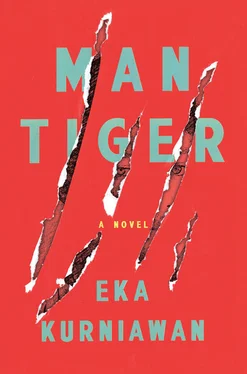The letters usually arrived on Mondays at ten in the morning. A postman would come on foot, his bag on his shoulder, his shoes always smeared with maroon clay, to hand out letters at the village hall. Treated to warm sweet tea and potato chips, he would remain there half an hour before returning the way he had come. The girls would wait in front of the hall; some would receive letters from their fiancés, while others sulked in disappointment, remaining hopeful that next week would be different. Of course there would always be letters for other people in the village, but believe me, the numbers were insignificant.
The Monday after Komar left, Nuraeni was busying herself from dawn in anticipation of his letter. She cleaned the house and mopped the floor so she could get to the village hall early. In those days most of the houses stood on stilts, with wicker flooring that needed mopping every day to keep away the grime and dust. When her father returned from the surau, the floor was already glistening in the glow of the wick lamp. Nuraeni rushed to the kitchen, lighting the stove with coconut fibers, blowing on it through a bamboo shaft to get it blazing, and stoking the fire with pieces of firewood as the flames danced. She heated some water on the stove, and while waiting for it to boil, she washed some rice and let her mother do the rest, because she had to hurry to the water spout to wash their clothes and dirty dishes.
The girl was nimble and swift in everything she did that day, carrying a bucket of dirty laundry in one hand and a pail full of dirty plates and glasses in the other. Her family owned a fishpond by the water spout where they showered and did the washing, with water flushing through bamboo pipes stretching for miles all the way up to the springs in the hills. The spout was surrounded by a chest-high wall, with sugar palm leaves for a roof, and served as the family’s bathroom. As she did the washing, her father fed the fish with taro leaves plucked from the pond’s levee.
The sun rose as Nuraeni finished the dishes and tossed the kitchen leftovers into the pond, the fish competing for the remnants of rice and stale food making the water bubble. Sunlight dappled the ground. Some villagers in tattered shirts and worn-out shorts walked by carrying hoes with which to wrestle the earth, while others checked their dry fields and gathered wood with machetes. A floating mist crept up toward the hilltops, as the shrill voices of girls chatting across the distance between two waterspouts drowned out the sparrows and woodpeckers. Schoolchildren lined the fishpond levee, throwing pebbles into the water, bags swinging behind their backs and caps covering their little heads.
Nuraeni took off her clothes, threw them on top of the wicker wall, and modestly covered the entrance to the spout with a towel, although the plaited bamboo strips didn’t conceal her shape entirely. Holding her knees, she sat under the plentiful and sparkling water pouring from the bamboo pipe, wet hair draping her body. Washing away the sweat, the shower lifted her spirits, as she rubbed her skin with soap, checking the creases between each toe, scrubbing off the dirt, rinsing her hair with aloe, and remaining sat under the spout, just as she was, as she brushed her teeth.
The chatter of the girls at the other spouts faded; they were leaving, and perhaps some of them were already packing the village hall’s veranda, waiting for the exhausted postman. Nuraeni stepped out of the cabin, dried herself, and wrapped a towel around her body, covering the top of her thighs and her unripe breasts. She coiled her hair up, picked up the bucket of wet laundry with one hand and the pail of sparkling plates and glasses with the other, and moved with catlike steps, treading on the levees between the ponds, exquisite under the rising sun. She was unconscious of her beauty.
Just before ten o’clock Nuraeni was at the hall, with her damp hair in two neat braids and tied with a faded yellow bow at each end. She had guessed right. The other girls were already cramming the long bench under the announcement board bearing last Ramadan’s timetable as well as other information that could easily be ignored. Some girls who didn’t get a seat gathered under a mussaenda tree by the bamboo fence, and Nuraeni joined them to exchange funny stories about Lebaran.
And yet she was still thinking about the letter, because this was the first time she had ever waited for a letter from a man. Her heart was pounding. What kind of surprise would that first letter hold? Ugly handwriting, perhaps. Even this was enough to feed her excitement. Maybe it would be sprinkled with scented powder, like the letters her best friend, Nyai Sri, got from her boyfriend.
What happened was entirely unexpected. The exhausted postman arrived with a stack of letters held together with an elastic band. The girls spread them on a table while the postman fanned himself with an old newspaper. Girls yelped upon finding their names on those white envelopes with blue-and-red stripes along the edges, while others snorted in disappointment having found nothing addressed to them. Nuraeni was among the persistent searchers who scoured the few unclaimed letters remaining, most of them addressed to the village head and a few to parents from their children. She stood looking at the scattered envelopes, almost in tears. None of the letters was for her. She went home with red eyes and lips pursed shut, thinking desperately of the following Monday. She had never known bitterness like this, and it was all because of Komar.
She grew increasingly distressed with the absence of a letter the following week, and the next, and in the weeks thereafter. The other girls might miss out on a letter now and then, but at least once a month one would turn up. Some would get beautiful presents; one or two were sent the money to buy a ring, while others might find sewing machines with their names on. One girl was even sent a wedding dress, but there was never anything for Nuraeni.
After a few agonizing weeks, she stopped going to the village hall. The photo of Komar posing before the Kombi, which she had framed and placed next to her bed, now lay inside a tattered box under her bed. At first she had wanted to rip it up and throw it into a blazing stove. She stopped hoping for anything, didn’t want to talk about him, let alone allow him to toy with her imagination by intruding on her daydreams, and if he sneaked into her sleep, the dream would turn into an aggravating nightmare.
As time passed, she began to suspect that Komar didn’t really love her and had no intention of marrying her. Just think, she said to herself, last Lebaran he didn’t take her to that photo studio near the Koranic school. He clearly didn’t want her picture in his wallet, and felt it was sufficient to leave her a blurred picture of himself, probably taken from a distance with an instant camera. She was jealous of the other girls, who had gone with their boyfriends to the Tan Brothers studio, the only Chinese family they knew, wearing lovely dresses, powder, and lipstick, and standing before a floodlight — or so the girls told her — to get their photos taken against a backdrop of swans upon a pond.
With time all hope that the wedding would happen vanished. She was a little girl again, although she didn’t resume ploughing the rice fields or herding sheep. She no longer bothered with primping herself and looked forward to the time when, through some good fortune, the engagement would be broken. Then maybe another man would propose, a man who would send her letters, take her to be photographed, and maybe even give her a beautiful ring and a sewing machine so she could learn to make her own wedding dress.
She went about life as if she didn’t have a fiancé, and painfully she had to mask her situation. Perhaps a few friends knew the truth, but she tried to convince herself they were too busy with their own lives to realize that someone among them had been spurned by her fiancé. When people asked for news of Komar — and Syueb himself would visit to find out this or that about the bad manners of his son — Nuraeni would tell them he was fine, but he wasn’t coming home before the next Lebaran. She felt like a know-it-all witch who could spy on her lover through a small mirror, and if that were indeed the case, she would love to throw rocks at him and hit him with a rice-pounder, because nothing else would show how much she resented that man.
Читать дальше












